
_______
In all my commentaries, I have been very clear in my support for my native Coast province, the region and people that have been marginalized by two successful governments of Mzee Jomo Kenyatta and Daniel arap Moi. I also have not hidden my support of the courageous political leadership of Chirau Mwakwere who together with other forward looking visionary Coastal leaders are working closely with President Mwai Kibaki and his government for the benefit of the province and the people. And last but not least my support of the national leadership of President Mwai Kibaki has been as clear as blue sky.
I am no politician and eighty percent of the time I do not even reside in Kenya for those who might suspect that my support is more of a flatterer politician and or that of a political sycophant expecting some financial handouts or a presidential appointment. I have supported this president since he came to power. I have never expected anything in return but good governance, free media, national developments, and above all fair distribution of national resources.
Many people are in the view that, since one happens to be a longtime resident of the United States and my name is not what one would have assumed to be from the slopes of Mount Kenya, then I should support the opposition and not the establishment. One of the fundamental cores of the United States foreign policy is that of looking after and protecting their national interests. The same applies to me, Kibaki is best for my region, my people and my country and as such I have no option but support him.
For instance, those who know me and those who have been following my commentaries and analyses know very well that I have been an advocate for the public university to be established at my native province. So when President Kibaki signed in the Kenya Gazette the establishment of two university colleges I was elated. Two successful governments of Presidents Kenyatta and Moi did not see it fit to establish a public university in the region, one of the richest provinces in the country. I have been accused to be a crusader for urging my fellow Coast compatriots not to allow anyone to trivialize this education advancement.
The emergence of the Transport minister has changed the political equation in the region. The Matuga MP is from a populous Mijikenda community and is also a Muslim adherent. The Mijikenda being the populous tribes and the province has a Muslim majority. The regional political leadership of Mwakwere is that of a silent burner, where it cooks without making any noises. Mwakwere is hated by some opposition leaders because the man is unlike previous Coast politicians, he is educated. This is a man with two graduate degrees, and has as much senior governmental working experience as any other Kenyan out there.
Previous Coast political leadership was uneducated, so unfocused such that, some of them were happy with assistant ministerial positions. Coast voters like their previous leadership was taken for granted the same way African-American votes have always been taken for granted by the Democratic Party.
I bring this matter to surface because; the media’s cunning is very biased when it comes to certain politicians. Coast politicians are the first causalities of the media bias, simple because they do not have any editors from the region. For instance when Raila and his group defected from ODM Kenya to ODM, the press did not refer the move as defection. One would have expected the newspapers’ banner headlines the next day to read something like: "Raila Odinga defects” or “Mother of all defections" instead it was "Fallout" or "ODM finally splits" as was the case with two dailies headlines.
______________
I abhor this discrimation
Two days ago, while presiding over the award ceremony of a university charter to St. Paul's University in Limuru, President Mwai Kibaki noted that ‘the Government is progressively moving towards ensuring that all Kenyan children have access to at least 14 years of education.’
The head of state went on to observe that ‘demand for higher education continues to rise as more secondary students qualify each year for university education, and said government policy calls for strong partnerships between the Government, private sector, and other interested parties in expanding higher education in this country.’
St. Paul University is a catholic university and it is one of the more than a dozen Christian based universities and colleges in the country. Despite such a high number of Christian religion oriented institutes there is not a single Islamic University in the country. All the Christian colleges and universities are recognized by the government through the ministry of education. Interestingly the three Islamic colleges that exist in the country are not recognized by the same Ministry of Education. A clear double standard on the part of the George Saitoti’s run Ministry of Education.
While speaking during a launch of National Muslim Education Trust (NMET) in Mombasa recently, a senior official of the trust, Sheikh Ahmad Msallam stated, "There has been several attempts and efforts made to get authority to start an Islamic University but it has proved difficult to get an interim certificate from the commission of higher authority." The trust has already set aside the required piece of land where they want to have the institution outside Mombasa.
President Mwai Kibaki was very clear when he pointed out that government policy calls for strong partnerships between the Government, private sector, and other interested parties in expanding higher education in this country. NMET is one of those other interested parties (a religious one) that want to expand higher education in Kenya.
Msallam and his group are forwarding their memorandum, with regards to being given permission to establish the university, directly to the head of state as their previous efforts have met deaf ear from the chairman of the Commission for Higher Education Prof. Kihumbu Thairu. The proposed Islamic University aims to offer degrees in business administration, sciences and computer, far beyond theological studies.
While visiting Garissa earlier this month President Kibaki emphasized that his Government does not condone any form of discrimination and assured the Muslim community that they will not be discriminated on the basis of their religion. Boldly speaking Mr. President what is going on at the Commission for Higher Education is pure discrimination and it must stop. Thairu and his team are practicing a form of discrimination against these private Muslims and Islam establishment.
_____________
If you cannot beat them, join them
The decision not to contest the presidency by Uhuru Kenyatta in this year’s general election was settled way back after the Gatundu South MP lost the presidential election to President Mwai Kibaki in 2002 general election. His announcement on Thursday that KANU will not seek the presidency was a mere formality. It’s like pregnancy, where one knows the mother will have baby, but it takes nine months for the bay to be born.
Uhuru’s best shot for the presidency was in 2002, where former president Daniel arap Moi thought he was literally handing over the presidency to his predecessor’s son. Moi himself has since opted to support Kibaki’s re-election bid and says he will campaign for the re-election of his successor, the person whom Moi did everything in his power to block from winning the presidency in 2002. I guess if you can’t beat them join them. With Moi opting out and with Uhuru Kenyatta lacking a national constituency it was a foregone conclusion for Uhuru to throw the towel.
One can say that Kenyatta has made the best decision in his political career, for opting not to compete for the presidency in the coming general election. Not only would he have lost at the presidency level, but he would definitely have emerged in third or fourth place and certainly would have lost his Gatundu South parliamentary seat. What was interesting to me was what Uhuru said. The Gatundu legislator was quoted to have said that he was not the type to run for the presidency just for the sake of it, but one to do so only when he was sure of a win. He went on to add that ‘We are not people who just run. We run when we are sure we can win. I am leading the party to the next government.’
The way I see it is that, Uhuru is supporting Kibaki because the president is the better candidate and deserve a second and final term to complete what his Government has started. Uhuru is supporting him because he has no choice and no chance of beating him. The support of Uhuru to President Kibaki re-election campaign is only symbolic. It is in fact more beneficial to Mr. Kenyatta and his team than it is to Kibaki. Uhuru and his team bring virtually nothing to the table. For instance, in his native Central province where in the last election he was able to secure a good chunk of votes, this time around the region is firmly rallying behind the incumbent. Kibaki does not need to waste time campaigning in his native province.
In Rift Valley where under Moi, the expansive and the most populous province became the core of KANU is today having their own agenda independent of KANU and Uhuru Kenyatta. The region’s politicians are campaigning for one of their own to be appointed Kibaki vice president in return for supporting Kibaki re-election. Without Central and Rift Valley provinces, Uhuru and or KANU have nothing to talk about or to bring to the table. The Coast KANU politicians in mainly from Taita Taveta and Wundanyi have already declared their support for Kibaki. In fact the seaside province based Shirikisho is at the forefront in the Kibaki friendly parties’ coalition talks at the bona fide representative of the province.
It will be interesting to see how KANU’s position will be in the Kibaki allied coalition of friendly parties.
The writer can be reached at: omarahmedali@gmail.com
I am no politician and eighty percent of the time I do not even reside in Kenya for those who might suspect that my support is more of a flatterer politician and or that of a political sycophant expecting some financial handouts or a presidential appointment. I have supported this president since he came to power. I have never expected anything in return but good governance, free media, national developments, and above all fair distribution of national resources.
Many people are in the view that, since one happens to be a longtime resident of the United States and my name is not what one would have assumed to be from the slopes of Mount Kenya, then I should support the opposition and not the establishment. One of the fundamental cores of the United States foreign policy is that of looking after and protecting their national interests. The same applies to me, Kibaki is best for my region, my people and my country and as such I have no option but support him.
For instance, those who know me and those who have been following my commentaries and analyses know very well that I have been an advocate for the public university to be established at my native province. So when President Kibaki signed in the Kenya Gazette the establishment of two university colleges I was elated. Two successful governments of Presidents Kenyatta and Moi did not see it fit to establish a public university in the region, one of the richest provinces in the country. I have been accused to be a crusader for urging my fellow Coast compatriots not to allow anyone to trivialize this education advancement.
The emergence of the Transport minister has changed the political equation in the region. The Matuga MP is from a populous Mijikenda community and is also a Muslim adherent. The Mijikenda being the populous tribes and the province has a Muslim majority. The regional political leadership of Mwakwere is that of a silent burner, where it cooks without making any noises. Mwakwere is hated by some opposition leaders because the man is unlike previous Coast politicians, he is educated. This is a man with two graduate degrees, and has as much senior governmental working experience as any other Kenyan out there.
Previous Coast political leadership was uneducated, so unfocused such that, some of them were happy with assistant ministerial positions. Coast voters like their previous leadership was taken for granted the same way African-American votes have always been taken for granted by the Democratic Party.
I bring this matter to surface because; the media’s cunning is very biased when it comes to certain politicians. Coast politicians are the first causalities of the media bias, simple because they do not have any editors from the region. For instance when Raila and his group defected from ODM Kenya to ODM, the press did not refer the move as defection. One would have expected the newspapers’ banner headlines the next day to read something like: "Raila Odinga defects” or “Mother of all defections" instead it was "Fallout" or "ODM finally splits" as was the case with two dailies headlines.
______________
I abhor this discrimation
Two days ago, while presiding over the award ceremony of a university charter to St. Paul's University in Limuru, President Mwai Kibaki noted that ‘the Government is progressively moving towards ensuring that all Kenyan children have access to at least 14 years of education.’
The head of state went on to observe that ‘demand for higher education continues to rise as more secondary students qualify each year for university education, and said government policy calls for strong partnerships between the Government, private sector, and other interested parties in expanding higher education in this country.’
St. Paul University is a catholic university and it is one of the more than a dozen Christian based universities and colleges in the country. Despite such a high number of Christian religion oriented institutes there is not a single Islamic University in the country. All the Christian colleges and universities are recognized by the government through the ministry of education. Interestingly the three Islamic colleges that exist in the country are not recognized by the same Ministry of Education. A clear double standard on the part of the George Saitoti’s run Ministry of Education.
While speaking during a launch of National Muslim Education Trust (NMET) in Mombasa recently, a senior official of the trust, Sheikh Ahmad Msallam stated, "There has been several attempts and efforts made to get authority to start an Islamic University but it has proved difficult to get an interim certificate from the commission of higher authority." The trust has already set aside the required piece of land where they want to have the institution outside Mombasa.
President Mwai Kibaki was very clear when he pointed out that government policy calls for strong partnerships between the Government, private sector, and other interested parties in expanding higher education in this country. NMET is one of those other interested parties (a religious one) that want to expand higher education in Kenya.
Msallam and his group are forwarding their memorandum, with regards to being given permission to establish the university, directly to the head of state as their previous efforts have met deaf ear from the chairman of the Commission for Higher Education Prof. Kihumbu Thairu. The proposed Islamic University aims to offer degrees in business administration, sciences and computer, far beyond theological studies.
While visiting Garissa earlier this month President Kibaki emphasized that his Government does not condone any form of discrimination and assured the Muslim community that they will not be discriminated on the basis of their religion. Boldly speaking Mr. President what is going on at the Commission for Higher Education is pure discrimination and it must stop. Thairu and his team are practicing a form of discrimination against these private Muslims and Islam establishment.
_____________
If you cannot beat them, join them
The decision not to contest the presidency by Uhuru Kenyatta in this year’s general election was settled way back after the Gatundu South MP lost the presidential election to President Mwai Kibaki in 2002 general election. His announcement on Thursday that KANU will not seek the presidency was a mere formality. It’s like pregnancy, where one knows the mother will have baby, but it takes nine months for the bay to be born.
Uhuru’s best shot for the presidency was in 2002, where former president Daniel arap Moi thought he was literally handing over the presidency to his predecessor’s son. Moi himself has since opted to support Kibaki’s re-election bid and says he will campaign for the re-election of his successor, the person whom Moi did everything in his power to block from winning the presidency in 2002. I guess if you can’t beat them join them. With Moi opting out and with Uhuru Kenyatta lacking a national constituency it was a foregone conclusion for Uhuru to throw the towel.
One can say that Kenyatta has made the best decision in his political career, for opting not to compete for the presidency in the coming general election. Not only would he have lost at the presidency level, but he would definitely have emerged in third or fourth place and certainly would have lost his Gatundu South parliamentary seat. What was interesting to me was what Uhuru said. The Gatundu legislator was quoted to have said that he was not the type to run for the presidency just for the sake of it, but one to do so only when he was sure of a win. He went on to add that ‘We are not people who just run. We run when we are sure we can win. I am leading the party to the next government.’
The way I see it is that, Uhuru is supporting Kibaki because the president is the better candidate and deserve a second and final term to complete what his Government has started. Uhuru is supporting him because he has no choice and no chance of beating him. The support of Uhuru to President Kibaki re-election campaign is only symbolic. It is in fact more beneficial to Mr. Kenyatta and his team than it is to Kibaki. Uhuru and his team bring virtually nothing to the table. For instance, in his native Central province where in the last election he was able to secure a good chunk of votes, this time around the region is firmly rallying behind the incumbent. Kibaki does not need to waste time campaigning in his native province.
In Rift Valley where under Moi, the expansive and the most populous province became the core of KANU is today having their own agenda independent of KANU and Uhuru Kenyatta. The region’s politicians are campaigning for one of their own to be appointed Kibaki vice president in return for supporting Kibaki re-election. Without Central and Rift Valley provinces, Uhuru and or KANU have nothing to talk about or to bring to the table. The Coast KANU politicians in mainly from Taita Taveta and Wundanyi have already declared their support for Kibaki. In fact the seaside province based Shirikisho is at the forefront in the Kibaki friendly parties’ coalition talks at the bona fide representative of the province.
It will be interesting to see how KANU’s position will be in the Kibaki allied coalition of friendly parties.
The writer can be reached at: omarahmedali@gmail.com







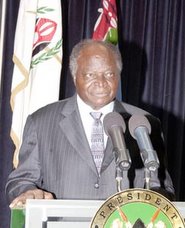


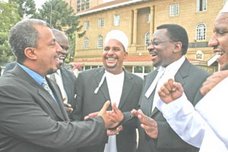
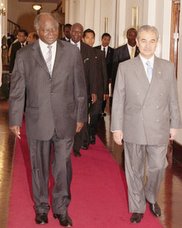

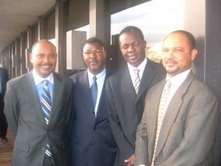
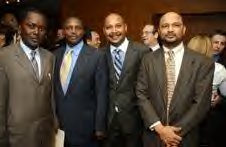
No comments:
Post a Comment